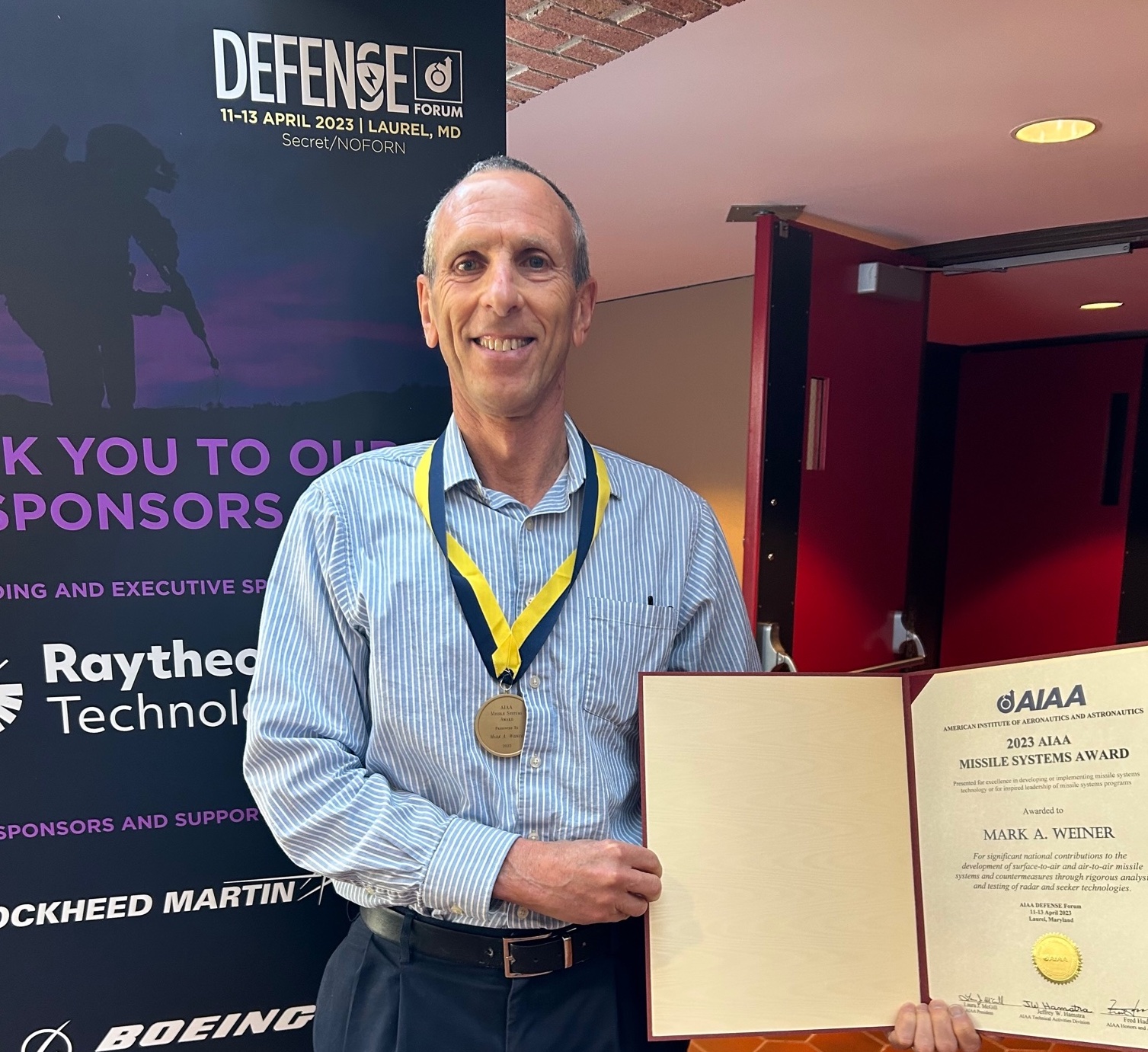Lincoln Laboratory's Mark Weiner receives AIAA Missile Systems Award

The American Institute of Aeronautics and Astronautics (AIAA), the world's largest technical society dedicated to the global aerospace profession, has recognized Mark Weiner of MIT Lincoln Laboratory with the 2023 Missile Systems Award. Weiner — a senior staff member in the Tactical Defense Systems Group, part of the Laboratory's ISR and Tactical Systems Division—received the award "for significant national contributions to the development of surface-to-air and air-to-air missile systems and countermeasures through rigorous analysis and testing of radar and seeker technologies." Weiner was presented with his award during the AIAA DEFENSE Forum on April 13 at the Johns Hopkins University Applied Physics Laboratory in Laurel, Maryland.
"I am honored to receive this award," says Weiner. "I owe my accomplishments to the shared efforts of the many dedicated people whom I have collaborated with over the years at Lincoln Laboratory, within government, and among defense contractors. Our defense mission is truly a team effort, and I am proud to be part of it."
The Missile Systems Award, presented biennially, honors individuals who have demonstrated excellence in developing or implementing missile systems technology, including through significant technical accomplishments or leadership of missile systems programs. Over a 40-year career, Weiner has guided U.S. development of advanced ground-based and air-to-air missile systems and countermeasures. Conducting seminal engineering work at Raytheon, Weiner was involved in the early development of now-foundational radar and seeker technology for U.S. missile systems. For the past 35 years, he has been working at Lincoln Laboratory on radar and missile systems for the U.S. Air Force and Department of Defense, serving as a trusted advisor on critical technology roadmaps and system acquisitions.
In these positions, Mark has been a pioneer in understanding missile guidance phenomenology and performance by applying modeling and simulation techniques to evaluate propagation of radar frequency, assess advanced signal processing algorithms, design robust waveforms, and consider full-spectrum electronic warfare. He has also led the development and employment of airborne assets leveraged by government and industry to test integrated radar and missile seeker technologies. These test beds have flown hundreds of missions across nearly all national test ranges in support of many important U.S. missile acquisition programs. Through his testing and analysis efforts, Weiner has helped identify, diagnose, and enhance numerous performance parameters of new and existing systems to meet evolving mission needs.
"It is wonderful to see Mark receive this prestigious award recognizing his achievements," says Marc Viera, head of the ISR and Tactical Systems Division. "He is truly a national asset, and his work on missile systems and his mentorship have inspired many to address important problems for national defense."
Weiner has impacted the larger aerospace community through knowledge and technology transfer. He has delivered influential briefings at the Laboratory's annual Air Vehicle Survivability Workshop, widely regarded as a premier venue for shaping U.S. direction on future technology development and acquisition efforts; published his technical findings in various open forums; and transitioned new missile architectures he supported or created to partners including the Defense Advanced Research Projects Agency, U.S. Air Force and Navy, and multiple prime contractors.
Weiner joined the Laboratory in 1988 as a technical staff member in the former Air Defense Techniques Group, rising to assistant leader in 1995. He continued serving as assistant leader of various Laboratory groups before he was promoted to associate leader of the Tactical Defense Systems Group in 2000. In 2016, he was appointed senior staff within this group. Weiner began his career in 1981 as an engineer in Raytheon's Missile Systems Division. He earned a BS degree from Union College in 1980 and an MS degree from the University of Pennsylvania in 1981, both in electrical engineering.
Inquiries: contact Ariana Tantillo.
Related Links